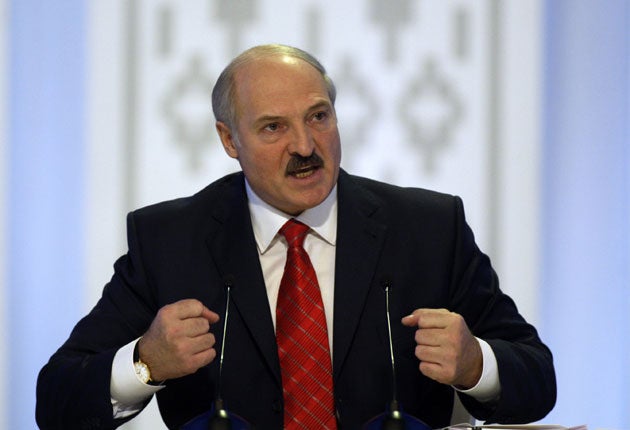Britain calls on EU to impose new sanctions against Belarus
Measures to include freezing assets and banning visas of Lukashenko's associates over his human-rights crackdown

Your support helps us to tell the story
From reproductive rights to climate change to Big Tech, The Independent is on the ground when the story is developing. Whether it's investigating the financials of Elon Musk's pro-Trump PAC or producing our latest documentary, 'The A Word', which shines a light on the American women fighting for reproductive rights, we know how important it is to parse out the facts from the messaging.
At such a critical moment in US history, we need reporters on the ground. Your donation allows us to keep sending journalists to speak to both sides of the story.
The Independent is trusted by Americans across the entire political spectrum. And unlike many other quality news outlets, we choose not to lock Americans out of our reporting and analysis with paywalls. We believe quality journalism should be available to everyone, paid for by those who can afford it.
Your support makes all the difference.The British Government will today press the European Union to impose a set of stringent new sanctions, including a full arms embargo, on Belarus in response to the regime's continuing crackdown on human rights.
At a meeting of the EU's Foreign Affairs Council in Luxembourg, the Foreign Secretary William Hague will also call on ministers to ban visas and freeze the assets of close associates of President Alexander Lukashenko.
The measures, which are expected to be passed, will be the toughest yet against the former Soviet republic after the disputed presidential elections last year. They come as a new report by the Organisation for Security and Co-operation in Europe (OSCE) detailed more evidence of widespread human-rights violations.
They are also designed to target big-business interests linked to the Belarussian regime – in particular, Vladimir Peftiev, who is known as "Lukashenko's banker". Mr Peftiev, the country's second-richest man and an economic advisor to the President, runs an arms-manufacturing company and the national telecommunications provider. He also has shares in an Austrian-owned bank and mobile-phone venture, which are likely to be hit by the new sanctions.
Western diplomats say Belarus earns more than £1.14bn annually in weapons sales, much of which goes into a secret fund controlled by the President. The call for tougher sanctions comes at a time of growing anger inside Belarus over the worsening human-rights situation and the country's crumbling economy.
An open letter to Mr Lukashenko, penned by the prominent dissident journalist Nikolai Khalezin, has become a rallying cry for reform with more than two million hits on Russian and Belarusian servers alone.
The country has been experiencing the worst human-rights crackdown in a generation with the regime arresting and imprisoning scores of political opponents after last December's disputed presidential elections. Virtually all the presidential candidates who dared to stand against Mr Lukashenko have been imprisoned or put under house arrest alongside dozens of opposition activists and journalists.
An estimated 300,000 people turned out in central Minsk to protest against the election results and most of those who are being tried face charges of "organising a mass riot". Hundreds more have been handed down brief prison sentences or fines for taking part in the demonstrations.
After a bomb blast on the Minsk metro in April, the repression has worsened with waves of fresh arrests and the closure of some of the few remaining semi-independent newspapers and human-rights groups.
Part of Mr Lukashenko's appeal has been his ability to keep Belarus sheltered from the economic upheavals that swept through the former Soviet republics. But there are now reports that ordinary Belarusians are selling their belongings to access hard currency as the rouble plummets. Two week's ago, Minsk was forced to ask the IMF for an $8bn (£5bn) bailout as inflation tripled to 13.1 per cent in May.
Despite the ongoing crackdown, hundreds of Belarusians defied a ban on public protests and held silent demonstrations last week against the country's worsening economic crisis. Viasna, one of the country's few remaining independent human-rights groups, says 240 people have been arrested since then.
The OSCE report said: "The fact-finding mission indicates the seriousness, duration and scale of gross and systematic human-rights violations. This concern is not only a long list of individual cases of great concern but a system of social control, by fear and harassment, torture and blackmail."
On Friday the UN Human Rights Council signed off on a tough resolution for Belarus which commits the UN to instruct the Human Rights Commissioner to produce a full report on the country.
The council is due to discuss the situation again at its next meeting, where it could take further action.
Mr Hague said it was vital that the international community spoke with one voice against the regime: "The situation in Belarus is entirely unacceptable. We will not relent in our determination to make President Lukashenko recognise the rule of law and democratic freedoms, to free political prisoners and to end the human-rights abuses perpetrated by his government. The Arab Spring is a lesson that basic human rights and freedom of expression must be respected. Lukashenko must understand that he cannot continue to stifle the voice of his own people."
Last week, Mr Lukashenko gave a clear indication that Minsk would not tolerate further street protests. "I will look and watch and then I will strike hard so that they will not get a chance to defect abroad," he said.
Join our commenting forum
Join thought-provoking conversations, follow other Independent readers and see their replies
Comments